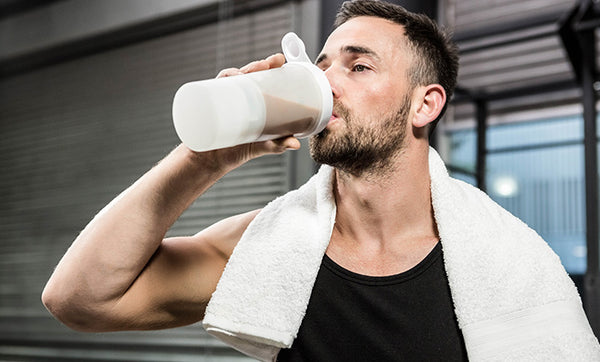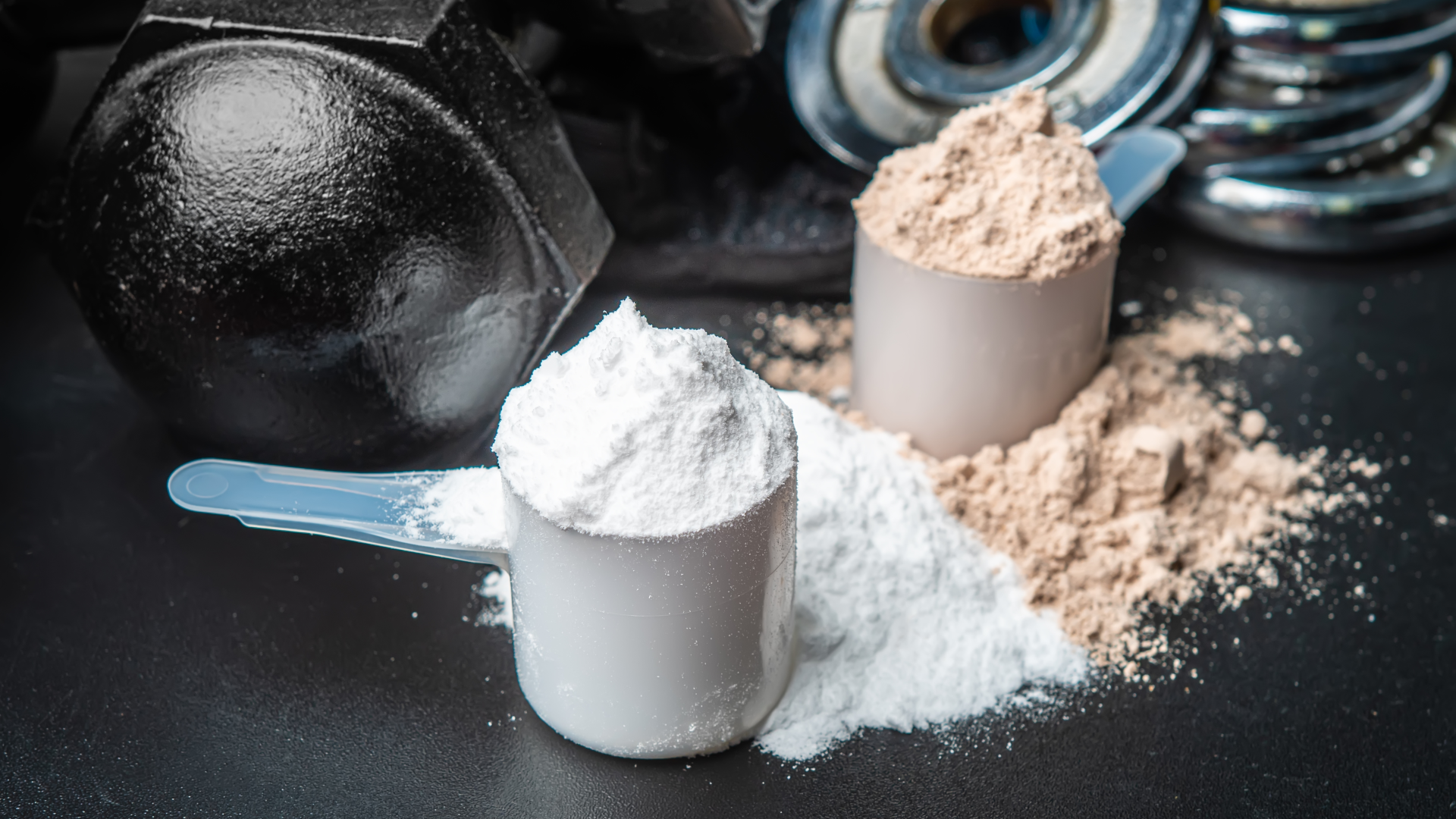When it comes to protein and workout supplements, the market has become more than saturated. The online stores of major retailers can feel like a maze, and there are a hundred different products that all promise the same results.
Whatever happened to keeping it simple?
Whey protein is a product you will likely have come across while searching for muscle growth. And it’s often the first thing people try to help them get the most out of workouts.
But what is whey protein, and do you need to take it to help you build muscle?
Why is it important to get enough protein?
If you are considering consuming a whey protein supplement, it’s a good idea to start by understanding why it’s essential to consume protein.
Did you know there are more than 10,000 types of protein?
It’s critical for almost every process in our bodies - we need it so that everything from our organs, muscles, bones, skin, and hair are healthy.
These are just some of the things that a healthy diet that includes protein can help:
- Great for bone health and strength
- Decreases muscle deterioration as you age
- Can lower blood pressure
- Supports your immune system.
Generally speaking, you want to consume as much protein as possible from animal and plant-based sources, e.g., meat, fish, eggs and tofu.
However, realistically, active people may have to supplement their diet with protein powder (whey protein being one option).
It’s no longer reserved for bodybuilders or top-of-the-league athletes. Whey protein powder can be used in addition to your diet to increase protein intake.
When it comes to protein powder supplements, there are three benefits that we are interested in.
1. Protein helps to build muscle…
The most well-known benefit, and likely why you are here, is that protein is vital for building muscle. This is no surprise, given all the many bodily functions that proteins are involved in.
So, Significant dietary protein levels are essential to build muscle strength and increase muscle mass. In addition, consuming protein protects against the reduction of muscle mass as we age, so protein powder can provide extra nutrition to those who need it.
- Related content: The best way to get protein into your diet
2. Muscle recovery…
Proteins are the body's building block, essential for re-building muscles post-workout. Repetitive movements (i.e., exercise) break down muscle cells and essentially cause damage that needs to be rebuilt.
If your muscles recover faster, you can exercise harder and more often.
If you take protein, you will get better overall results and reduce aches and pains.

3. Weight management…
Next up is weight management. Even those who were lean in our youth start to notice our weight creeping up as we move into our late 20s and 30s.
This is entirely natural, but getting enough protein is key to maintaining a healthy muscle-to-fat ratio.
High protein foods are naturally more filling than carbs and fats and have better metabolism-boosting abilities due to protein's significantly higher thermic rate, i.e. we burn more calories digesting protein than when digesting fat or carbs.
Plus, if you aim to gain weight while training, consuming more protein provides the extra calories and fuel you need to increase your body mass.
And finally, higher muscle density helps you burn more fat, so as a by-product of muscle synthesis, protein may help you lose weight.
- Related content: Do protein shakes help with weight loss?
How much protein do you need to consume to build muscle?
Exactly how much protein you’ll need depends on what your goals are.
Speak to any health professional; their recommendation will likely be around 0.8g of protein per kilo of body weight. This protein level will support standard body functions - anything to do with cell growth and regeneration.
But if building muscle is your goal, you’ll need quite a bit more protein to support your workouts.
|
If you are building muscle, you should get around 2g grams of protein per kilo for at least the first 12 weeks. You can drop this down to 1.8g of protein per kg of weight after this initial training period. |
To put that into context, for a man weighing around 80kg, this would be 160g, equivalent to 12 eggs or five chicken breasts.
Consuming this protein level is tricky with diet alone (and it can be expensive). This is why protein supplements and shakes are often a preferred route for the health benefits associated with protein intake.
- Related content: How to get enough protein into your diet
What is whey protein?
So we’ve convinced you of the benefits of getting adequate protein in your diet, but why choose whey protein supplements?
Perhaps surprisingly, a lot of the protein contained in bars, drinks and powders is a by-product of cow’s milk. Although there are vegan alternatives, the bottom line is that milk protein (specifically whey) is the easiest protein for our body to absorb - easier than protein in meats or plants.
And it’s a similar story when it comes to protein supplements, which is why whey protein is one of the most popular and accessible supplements.
Cow’s milk has two proteins: whey protein and casein protein, and these can be separated to create different products.
|
Whey protein is a fast-digesting by-product of dairy protein, suitable for supplementing muscle repair and muscle synthesis. |
Both whey and casein are considered complete proteins containing all nine essential amino acids (or EAAs). The essential amino acids in whey protein include
- leucine
- lysine
- tyrosine
- cysteine
- isoleucine
- valine
- threonine
- tryptophan,
- histidine.
Our bodies can’t make essential amino acids, so we have to obtain them via the food we eat (or the supplements we take), and they are necessary for improving skeletal muscle mass.
How we metabolize the two proteins slightly differs, and whey protein is broken down more quickly than casein, meaning it is better for use before or after a workout. Plus, whey protein has an advantage over casein in building muscle mass due to its essential amino acid profiles.
Although whey is a by-product of milk, the lactose content is generally fairly low, which makes it possible for some people with lactose intolerance to use it. However, it is, of course, not a lactose-free product.
Types of whey protein powder: what is the difference between them?
The three most common types of whey protein are processed in different ways. Whey protein supplements most often come in powder form, and they are:
- Whey protein concentrate
- Whey protein isolate
- Whey protein hydrolyzed.
This table shows some of the standard differences between the three types of whey protein for a 25g scoop calculated from carb manager.
|
Whey protein concentrate |
Whey protein Isolate |
Whey protein hydrolysate |
|
|
Protein % by weight |
30-80% |
90% |
85% |
|
Protein |
7.55g-20g |
22.5g |
21.25g |
|
Lactose |
Highest |
Low |
Lowest |
|
Carbs |
1.4g |
0.3g |
1.7g |
|
Fat |
2.5g |
1.5g |
1.7g |
|
Cost |
£ |
££ |
£££ |
Whey protein concentrate undergoes the least amount of processing, which means it is higher in fat, lactose and carbohydrate levels than other types of whey protein. Depending on the processing level, the protein percentage can be anywhere from 30% to 90% in whey protein concentrate.
Whey protein isolate has been processed in a way that ramps the protein concentration up to 90% or higher and has very little lactose or fat. Low lactose concentration means those who struggle to digest dairy products often find that they are ‘okay’ with Isolate, but it isn’t 100% lactose-free. During the process, however, the product loses many nutrients found in whey concentrate.
Hydrolyzed Whey protein (hydrolysate) takes things one step further and is considered the “pre-digested” form of whey protein. This ensures it absorbs faster, increasing its effectiveness and giving it a slight improvement on whey isolate. However, as a pure form, it’s usually more expensive, and for many mean, it isn’t worth it.
Which type of whey protein powder should I take?
So which type of protein is best for you?
This might depend on your goals, i.e., if you are trying to lose weight, then purely whey protein concentrate might not be the best option.
Whey protein concentrate is the most common, cheapest and has more nutritional value than the others. However whey protein isolate and hydrolyzed whey protein have higher protein percentages, with lower lactose, carb and fat content - so might be better for those trying to lose weight - but comes at a higher cost.
But for most of the population, a blend will be the best option. It combines the benefits of all three types and is more affordable than purely whey protein isolate or hydrolyzed.
We have created an affordable product that contains all three. The Crazy Nutrition Tri-Protein is easy to digest, tastes great and uses six proteins that break down in 3 phases for more energy and strength than regular whey, hemp, or soy protein formulas.
Are there any side effects to taking whey protein powder?
Whey protein supplements are generally very safe, as they are a by-product of a food source consumed in vast quantities worldwide (milk).
However, some side effects are worth mentioning, as they may affect some people more than others.
The main one is down to the lactose content. As we’ve mentioned, this is low and often tolerable to those who have lactose sensitivities, as it’s not always due to the whey content.
However, if you do have a whey intolerance, then you might experience symptoms such as
- stomach pains
- cramps
- reduced appetite
- nausea,
- headache.
If this is the case, please speak to a health professional before taking whey protein to ensure you can take it without discomfort.
Is whey protein powder safe to take for my kidneys?
One of the worries about using whey protein is that it can add additional strain to your kidneys, which can cause long-term health impacts.
Also, protein contains a substantial concentration of microbes, which need to be filtered out on top of all the other work they are doing.
But, for a healthy adult, adding one protein shake to your diet a day is not going to have a significant negative impact on your health.
Of course, if you have any kidney issues such as kidney disease, then this might not be safe, and you should speak to your doctor before adding a protein powder shake to your diet.
- Related content: Is protein powder safe for your kidneys?
What time of day should I have my whey protein shake?
“You MUST take protein within 30 minutes of completing your workout!!”… Wow, dude.
This is the kind of statement bandied about all over the internet.
The truth?
As long as you get enough protein throughout the day, it will effectively ensure your muscles grow and recover after your workout.
Taking protein after a workout is a good idea, but don’t panic if your drive home from the gym takes 32 minutes. Professional athletes will have a more disciplined nutrition routine, but for even very serious gym go-ers, the main thing is to ensure you hit your protein target throughout the day.

Things aren’t quite simple for elderly adults, who may need to ingest protein quickly after a workout to get the best results.
You should also listen to your body. Protein can cause specific effects on your digestion, so if you avoid fruit after 6 pm to ensure a settled stomach and a good night's sleep, it might be wise to do the same with whey protein.
Should you mix whey protein with milk or water?
There is much debate about whether whey protein powder should be mixed with water or milk.
And the truth is that it can be combined with either it will often come down to your preferences and goals.
If you want to lose weight, mixing it with water might be the best option. Plus, mixing with water before a workout can make the protein more bioavailable i.e. it will be absorbed into your bloodstream more quickly.
Mixing protein with milk will take longer to enter your bloodstream, but this can be good if you are having it as part of a meal, or later in the evening. It will curb your hunger for longer, but it will also add additional calories to your day, which must be considered.
Of course, if you have any intolerances, you might be limited on which one you can mix it with - but either will still increase your protein intake massively.
- Related content: Protein powder with milk or water: what is the difference?
Is whey protein powder gluten-free?
If you have celiac disease or gluten sensitivity, you might wonder if you can consume whey protein powder.
Whey powder is a great source of protein, and those with sensitivities or allergies struggle more than others to get the nutrients into their body
But is whey protein powder gluten-free?
Technically most whey protein powders do not have any gluten-containing ingredients such as wheat or barley (although, of course, check each product's label to confirm this).
However, gluten-free is legally protected and can only be used if you meet specific requirements. To be labeled gluten-free, you not only have to exclude gluten-containing ingredients but also be able to confirm that there is no cross-contamination.
So, while many whey protein powders are technically void of gluten ingredients - they cannot be considered gluten-free.
There is gluten-free whey and plant protein powder if you have celiac disease or gluten sensitivity.
- Related content: Is whey protein powder gluten-free?
Whey protein powder vs. plant-based protein powder: which is right for you?
Whey protein powder is made as a by-product of milk, which means that while it’s vegetarian, it is not vegan - which makes it unsuitable for some people.
And, of course, while the lactose content in whey protein is often low enough to be tolerable, it still exists and might be unsuitable for some people.
However, there are multiple alternatives to whey protein, including
- Plant,
- Hemp,
- Soy,
- Pea.
So, what are the benefits of using these over whey proteins?
It depends on which one you are looking at, but they are all complete proteins that contain all the essential amino acids necessary to grow and repair muscles. However, the levels of amino acids that they contain are usually lower in comparison to whey protein.
in addition, whey protein is more easily digested than other plant-based proteins - meaning your body can put the protein to good use.
Ultimately it’s up to you which one you eat, but whey protein is one of the cheapest and best proteins for building muscle if your morals and body can handle it.
Will whey protein powder help you lose weight?
Muscle growth and weight loss often go hand-hand with each other, and whey protein can help you achieve both.
Firstly, whey protein powder enables you to build lean muscle mass (as already mentioned), and a higher muscle % in your body will mean you burn more calories at rest. This means that as standard, you’ll burn more calories, thus putting yourself in a calorie deficit.
In addition, protein shakes are healthy snacks that allow you to mean your calorie consumption, but without eating unhealthy snacks. They will help curb your appetite, stay full and eat within your calorie allowance.
If weight loss is a goal, then you might want to look at a protein with whey protein isolate in it and mix it with water more often than milk to keep calories, fat and carbs low.
Is whey protein the right choice for you?
Whey protein is a bit of a catch-all product, which is no bad thing. It is great for everyone, from new gym-goers to professional athletes.
After a healthy diet, whey protein supplements create a brilliant foundation to ensure no workout is wasted and that you build the muscle you need to support growth or weight loss.
So if you are looking to improve your body composition, have more energy for every workout and improve your overall health, then choose a simple, straightforward, forward and high-quality whey protein powder.
If you want to check our Tri-Protein, you can look here.




